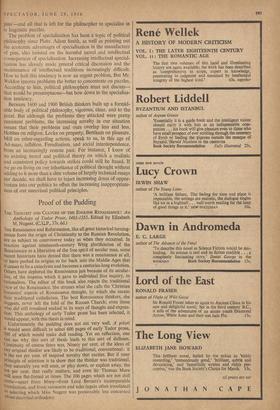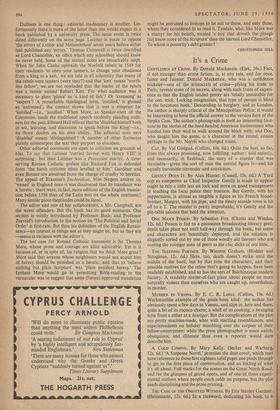Proof of the Pudding
RE THOUGHT AND CULTURE OF THE ENGLISH RENAISSANCE: An Anthology of Tudor Prose, 1481-1555. Edited by Elizabeth M. Nugent. (C.U.P., 37s. 6d.) Inc- Renaissance and Reformation, like all great historical turning- Points from the origin of Christianity to the Russian Revolution, ire as subject to controversy today as when they occurred. In reaction against nineteenth-century Whig glorification of the Renaissance as a liberation of the free spirit of secular man, some 'ecent historians have denied that there was a renaissance at all, )r have pushed its origins so far back into the Middle Ages that I ceases to be a cataclysm and becomes a centuries-long evolution. Jthers have deplored the Renaissance just because of its secular sm, of the impetus which it gave to individual free inquiry, to 'ationalism. The editor of this book also rejects the traditional ,Jcw of the Renaissance. She stresses what she calls the 'Christian atinztnist' aspects of Renaissance ,thought, by which she means heir traditional catholicism. The best Renaissance thinkers, she LIggests, never left the fold of the Roman Church; even those who did still remained soaked in its ways of thought and expres- ;ion. This anthology of early Tudor prose has been selected, it vould appear, with this thesis in mind. Unfortunately the pudding does not cat very well. A priori t would seem difficult to select 600 pages of early Tudor prose, i00 of which would make dull reading. Yet on reflection, one :an sec why this sort of thesis leads to this sort of dullness. -ontinuity of course there was. Ninety per cent. of the ideas of My original thinker are likely to be traditional, conventional: it s the ten per cent. of inspired novelty that excites. But if your minciple of selection is to show that the thinker was traditional, hen naturally you will omit, or play down, or explain away, the en per cent. that really matters; and even Sir Thomas More vill seem flat-footed at times. The 100 pages which are not dull 'time—apart from More—from Lord Berners's incomparable ranslations, and from romances and tales (again often translated) tt selecting which Miss Nugent was presumably less concerned :thou( doctrinal orthodoxy.
Dullness is one thing : editorial inadequacy is another. Un- fortunately there is more of the latter than one would expect in a book published by a university press. The same event is twice dated differently on the same page. Latimer is made to oppose 'the errors of Luther and Melanchthon' seven years before either had published any 'errors.' Thomas Cromwell is twice described as Lord Chancellor, an office which any schoolboy should know he never held. Some of the textual notes are remarkably inept. When Sir John Cheke upbraids the Norfolk rebels in 1549 for their readiness `to obey your tanners, to change your obedience from a king to a kett,' we are told in all solemnity that many of the rebels were tanners (were they?) and that 'kett' means 'worth- less fellow'; we are not reminded that the leader of the rebels was a tanner named Robert Kett. For what audience was it necessary to gloss 'plaice' as 'a kind of fish'? Or `evensong' as 'vespers'? A remarkable theological term, 'instified,' is glossed as 'enlivened'; the context shows that it was a misprint for lustified'—i.e., 'justified.' When More, as Speaker-elect of the Commons, made the traditional speech modestly pleading unfit- ness for the post, Edward Hall tells us that he 'disabled himself both in wit, learning, and discretion to speak before the King'—i.e., he threw doubts on his own ability. The editorial note says 'disabled' means 'distinguished' ! A number of other footnotes plainly misinterpret the text they purport to elucidate.
Other editorial comments are open to criticism on grounds of bias. To say that Latimer 'curried favour with Henry VIII' is surprising : but then Latimer was a Protestant martyr. A time- serving Roman Catholic prelate like Richard Fox is defended from 'the harsh criticism often levelled at him.' Gardiner and even Bonner are absolved from the charge of cruelty to heretics. The appeal of Erasmus's Enchiridion, Miss Nugent assures us, 'waned' in England once it was discovered that its translator was a heretic : there were, in fact, more editions of the English transla- tion before 1550 than of the Latin text on the whole continent!, Many similar pious ineptitudes could be listed.
The editor and one of her collaborators, a Mr. Campbell, are the worst offenders. But the book has its good moments. One section is wittily introduced by Professor Bush; and Professor Zeeveld's introduction to the section on 'The Political and Social Order' is first-rate. But then his definition of the English Renais- sance—an interest in things not as they might be, but as they are —seems at variance with the editor's.
The test case for Roman Catholic humanists is Sir Thomas More, whose prose and courage are alike admirable. Yet is it because of, or in spite of, his religion that we think More great? More said that anyone whose neighbours would not acquit him of heresy should be punished as a heretic; and that to 'believe nothing but plain Scripture' was 'plain pestilent heresy.' The farthest More would go in permitting Bible-reading in the vernacular was to suggest that some (future) approved translation might be entrusted to bishops to let out to those, and only those, whom they considered fit to read it. Tyndale, who, like More was a martyr for his beliefs, wanted 'a boy that driveth the plough [to] know more of the Scripture' than the learned Lord Chancellor. To whom is posterity's debt greater?
CHRISTOPHER HILL



































 Previous page
Previous page